
If you’re a rabbit owner, you know how skittish and fearful they can be. Rabbits often run and hide whenever they feel the presence of predators or hear unusual sounds. While we cannot know what goes on in a rabbit’s mind, they seem to play dead when startled or afraid occasionally. So, do rabbits play dead?
Rabbits do play dead when they feel threatened or frightened but almost always as a defensive tactic of last resort. As prey animals, rabbits tend to run when threatened but may play dead in an attempt to become less visible or appealing to predators.
Over time, rabbits have evolved to be very aware of their surroundings and stay alert for potential danger. While playing dead is a natural behavior in rabbits, there are a few instances where this habit can signify a more serious issue.
Read on to explore what playing dead means in rabbits, when you should be concerned, and how to safely revive your rabbit if they appear to be playing dead.
How Can You Tell That Your Rabbit is Playing Dead?
It can be terrifying to find your pet rabbit motionless. Nonetheless, there can be many reasons why your rabbit could be playing dead. It’s essential to understand the signs of this behavior to know what to look for. If you’re unsure whether your rabbit is playing dead or is deceased, check for physical signs of life, such as breathing, heartbeat, and movement.
Signs your rabbit may be playing dead may include:
- Lying motionless on the ground: Yes, this can sometimes be confused with rabbits being dead, but that’s the point. Pay attention because your rabbit will track your movement with its eyes. Typically means your rabbit is just playing dead.
- Refusing to respond to stimuli: When a rabbit feels threatened, the last line of defense is to play dead. Lying on the back or side with legs pulled into the chest can make them seem like they’re not moving!
- Slow, shallow breathing: Rabbits often enter into a trance-like state when they play dead. The metabolism slows, resulting in a slower breathing rate.
You should always check for movement if your bunny appears to be playing dead. It’s best to touch your pet away from the mouth to avoid a potential nip or bite. Typically, rabbits will begin to move again soon after being touched if all is well.
Is it Normal for A Rabbit to Play Dead?
Playing dead is a normal rabbit behavior implemented when threatened, frightened, or stressed. By lying still and pretending to be dead, rabbits hope to defuse stressful situations or deter predators. If your rabbit is playing dead constantly, consider removing stressors from its environment.
Occasionally, your rabbit may even play dead in an attempt to receive extra love. Pet rabbits adore attention, and if he feels like he is not getting enough, they may play dead to try and get more cuddles.
Ways to prevent a pet rabbit from playing dead include:
- Speak calmly and soothingly: Rabbits want to feel at ease in their environment, and if they are constantly being left in their cage or not interacted with, they will get upset. Always try to engage with your rabbit. He will quickly learn your voice, and speaking soothingly is an excellent way to communicate with your rabbit.
- Allow him out of the cage: Cages can be cumbersome for rabbits because they are typically small, so allowing your pet to spread its legs and explore is not bad. Be sure there are no hazards around.
- Keep other animals away: It’s not uncommon for rabbits to play dead when other animals are near, and if you have a dog that barks loud, it could even give your rabbit a heart attack.
- Give your rabbit cuddles: Rabbits crave attention, so taking him out of the cage and giving much-needed attention will help build a solid and lasting bond with your rabbit.
Your rabbit will want to feel safe and secure with its owner. You’re the person who feeds, waters, and plays with him. Your bunny will remember and learn to trust you because you are their person.
Do Rabbits Play Dead When Attacked By Predators?
It’s pretty evident that rabbits scare easily, but it’s worth exploring how your rabbit may act if a predator attacks. What defense mechanisms do rabbits employ? Do rabbits play dead when attacked?
Playing dead is an instinctive behavior that rabbits sometimes use to avoid predators. When attacked by a predator, rabbits will usually try to escape first. However, if escape is not possible, rabbits may try to defend themselves or even play dead.
Rabbits are prey animals, and their survival depends on their ability to avoid being detected by predators. When a rabbit plays dead, it lies still on the ground and makes no sound. This behavior sometimes fools predators, who will lose interest in the rabbit and move on.
However, playing dead is not always practical. Predators such as coyotes and foxes are smart enough to realize that the rabbit is not over. These predators wait for the rabbit to move before attacking it.
Rabbits are also endowed with other defense mechanisms such as:
- Speed – Rabbits usually run when attacked by predators. Rabbits can run up to 30 miles per hour and quickly outdistance most attackers.
- Powerful Hind legs – A rabbit can also kick predators, resulting in injury or death in rare cases.
- Sharp teeth – if a rabbit bites its attacker, the predator can receive severe tissue damage and may contract a deadly disease from the rabbit’s saliva, such as rabbit hemorrhagic disease.
Ultimately, there is no good way to tell whether a rabbit will fight or run away. A rabbit’s reaction will genuinely depend on the perceived nature of the threat.
Flopping Vs. Playing Dead in Rabbits

It’s easy to confuse between a flopping rabbit and one playing dead. Both share similar characteristics when performed by your bunny, but each is done for distinctly different reasons.
Rabbits Playing Dead
Rabbits are known for their ability to hide from predators. One of the ways they do this is by playing dead, also known as tonic immobility. When a predator finds a rabbit, it will often lie still and remain motionless to make the predator believe it is already dead. This strategy gives the rabbit a chance to escape while the predator is distracted.
Rabbits Flopping
Rabbits will also sometimes use a different strategy known as “flopping.” This is when the rabbit suddenly collapses and lies on its side, appearing to be dead. However, this is usually just a feint – the rabbit is not actually dead and will often jump up and run away as soon as the predator is gone.
In pet rabbits, flopping usually means your rabbit is happy. They feel secure and will flop to the side and lie down, letting everyone know they are glad. Rabbits like to let their owners know their feelings, and flopping shows excellent contentment.
Behavioral Signs: Flopping Vs. Playing Dead
Let’s look at the behavioral signs of flopping and playing dead with rabbits to help you distinguish between the two.
Behavioral signs of flopping Vs. playing dead in rabbits includes:
- Body language: If your rabbit is lying on its side with its eyes closed, he is probably just flopping. However, if lying on their side with their eyes open and alert, they may be playing dead.
- Breathing: If your rabbit takes deep, slow breaths, they are probably just flopping. However, if their breathing is shallow and fast, they may be playing dead.
- Motion: Rabbits playing dead will usually remain in the same position for an extended period. If your rabbit is flopping, on the other hand, they may move around more and be more responsive to you.
It can be worrying when you first notice your rabbit flopping or playing dead, but when you realize it is not a bad thing and pay attention to the body language, it will help you determine what is going on.
Trancing Vs. Playing Dead in Rabbits
Trancing has been around for a long time, and there is much discourse surrounding whether it is a good or bad thing for rabbits. Trancing is the act of putting a rabbit on its back to hypnotize the rabbit into staying in position, and the animal can look like it is playing dead.
This type of hypnosis puts a lot of strain on the rabbit, and it can lead to severe ramifications if not correctly done. So what’s the difference between trancing and playing dead?
Trancing most often occurs when a rabbit is picked up and held with its head on the handler’s shoulder. Playing dead generally happens when the rabbit is lying on its side. While trancing is typically a sign of trust and relaxation, playing dead is usually a defensive response to perceived danger.
Playing dead is usually only seen in wild rabbits, as domestic rabbits typically do not feel threatened in the same way. Both trancing and playing dead are normal behaviors for rabbits, and there is no need to be concerned if your rabbit exhibits either of these behaviors.
Rabbits Playing Dead: Is it Stress or Anger?
When trying to understand why your rabbit is playing dead, you need to understand whether your pet rabbit is stressed or just angry. Each behavior manifests very differently in your rabbit.
Rabbits very rarely play dead when angry. While rabbits can react to stressful situations by playing dead, an angry rabbit will typically grunt, show its teeth, or throw up its paws when unhappy.
Signs of stress that can lead your rabbit to play dead include:
- Flat Ears This suggests that your rabbit is stressed and could do with some TLC to make them feel themselves again.
- A tense posture: If they’re not walking correctly and seem anxious, this is another giveaway that it is stressed.
- A crouched position: If they go into the crouched position and nothing else seems to be wrong, this is another sign they are stressed.
- Your rabbit’s avoiding you: If rabbits are stressed, they want to be alone, so if you feel like the rabbit is running in the opposite direction from you, then it’s probably worried. They will sometimes hideout of the line of sight. This is not uncommon, but try to avoid disturbing them while they are like this.
- Grunting: If your little one hits the ground with its back legs, this could be a distress call to make you aware they are not feeling the best.
Here are some characteristics of an angry rabbit:
- Throwing its paws: If the rabbit looks like it’s throwing punches at you while sitting up, it is angry and does not want to be disturbed.
- Grunting: Rabbits rarely, if ever, make any noise, and the only instances they do is when they feel threatened. This is a dead giveaway that you may have a very unhappy rabbit.
- Showing teeth: You need to be careful with this because it means the rabbit can show its teeth as a warning, meaning that you should back away and give it space.
Why Would a Rabbit be Stressed or Angry?
If your rabbit shows any of the signs listed above, it would be wise to understand why it could act that way.
Your rabbit could be stressed out or unhappy as a result of:
- Ill health: The rabbit might not be feeling good because of an issue with its health, so it would be wise to get it checked over by a vet if the behavior does not improve.
- Lack of structure: Like humans, rabbits thrive when they have structure. If you’re turning the light on at different times of the day for the rabbit or feeding at various times every day, it can affect the rabbit. Sticking to the same schedule will allow your rabbit to know when to expect.
- Boredom plays a part: If the rabbit is not being interacted with and left in the cage alone, it could become upset and irritable.
- Cage is too small: This is common in many animals. A small enclosure will lead to the pet being stressed because they will feel enclosed. Always make sure the enclosure is the right size.
- They don’t have enough to do in the cage: Part of the fun of being a rabbit owner is keeping your rabbit on its toes. They are naturally curious, so hiding treats in the cage and giving more toys will lead to a happier animal overall.
- Rabbits can become lonely: If there’s a lack of interaction caused by the home being empty or the owner doesn’t interact, the rabbit will become upset. It is recommended to get more than one rabbit to have constant companionship in many cases.
- Changes to the environment: If you’ve moved house or rearranged furniture, this can confuse the rabbit and make them unhappy. Always make sure to make changes gradually as opposed to quickly.
As an owner of animals, you always need to be observant to pick up on any changes with your pets. Keen observation will help you dispel any issues that might arise.
Do Rabbits Play Dead When You Hold Them?

The notion that rabbits play dead when held by a human has been around for centuries. The belief likely originated from the fact that rabbits are relatively small and delicate animals, and they sometimes do appear to go limp when handled roughly.
While some people believe that rabbits play dead to avoid being handled, others think that it is simply a reflex reaction to feeling uncomfortable or scared. So, do rabbits play dead when you hold them?
Rabbits rarely play dead while being held. Rabbits most commonly play dead due to fear or stress, and it is most often seen in rabbits that are not properly socialized. If your rabbit exhibits this behavior, it’s essential to provide him with a safe space where he can feel secure.
Proper socialization can help reduce the likelihood of your rabbit feeling scared or stressed in your presence. However, if your rabbit feels threatened or frightened by you, he may lie still to make himself less visible to danger. In some cases, your rabbit may even fall over on its side, appearing dead.
However, not many rabbits enjoy being held. It’s always best to pick up your rabbit carefully and only when required. Building a strong bond with your pet rabbit will build trust and reduce anxiety in your pet.
Tips for holding a rabbit so that it won’t play dead include:
- Start early: You want the rabbit to become accustomed to being handled by a human, so pick them up in their infancy.
- Always be gentle: The rabbit will not play dead or try to run away if it feels safe. There’s a good chance it will nestle into your hands and be happy at getting the attention.
- Cover their eyes: This is not bad because it can help them feel more relaxed while being held, but never cover the eyes with anything heavy and make sure their nostrils are not obstructed.
- Never pick them up by their ears: This may be self-explanatory, but it’s always good to be aware of the dos and don’ts.
- Only ever place rabbits on a hard, non-slip surface: If you put a rabbit back down, there’s a chance their first instinct will be to run. They can harm themselves if this is done on a slippery surface.
There is no hard and fast rule on whether your rabbit will play dead while being held, but an excellent place to start is by adequately handling your rabbit early on.
Conclusion
Because rabbits cannot communicate well vocally, it’s vitally important to build a strong bond with your rabbit to understand his needs better. It’s not an easy task to understand why your rabbit is playing dead, but you always need to consider why things have changed.
If you notice a recurring issue that causes your rabbit to play dead, you need to make a change to ensure your pet is comfortable and happy. Your rabbit playing dead isn’t necessarily a bad thing, and it can also be confused with trancing or flopping. Your rabbit should be fine if you know how to pick up on these changes.
